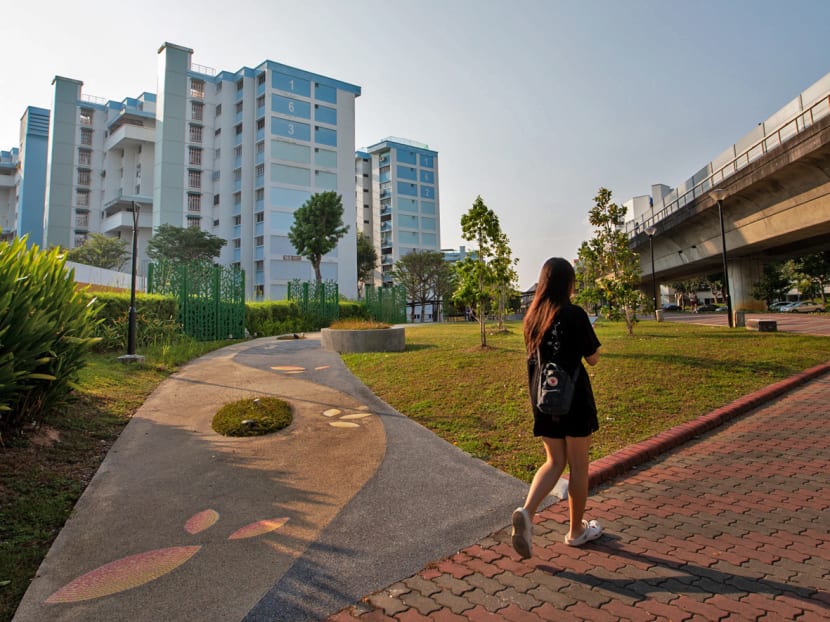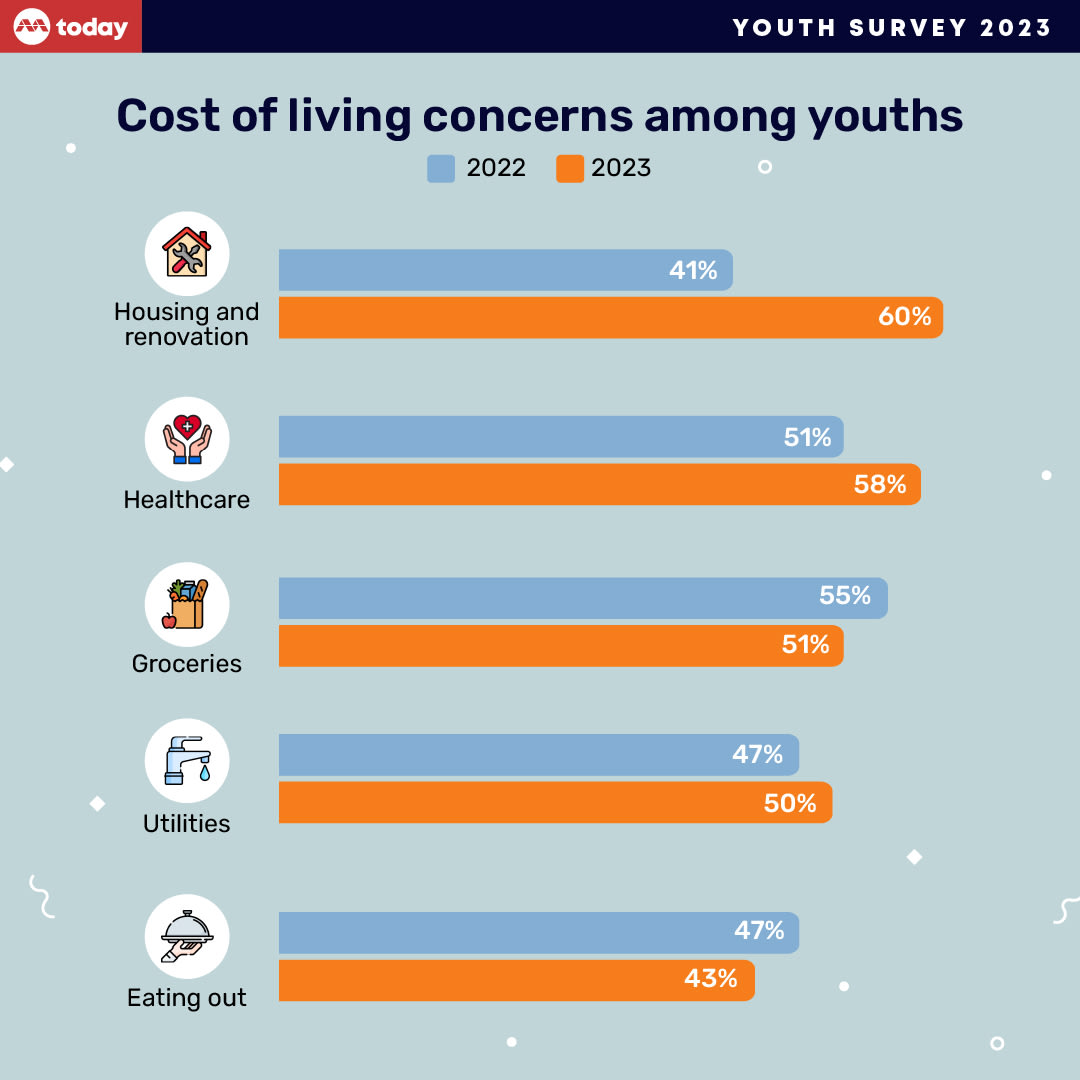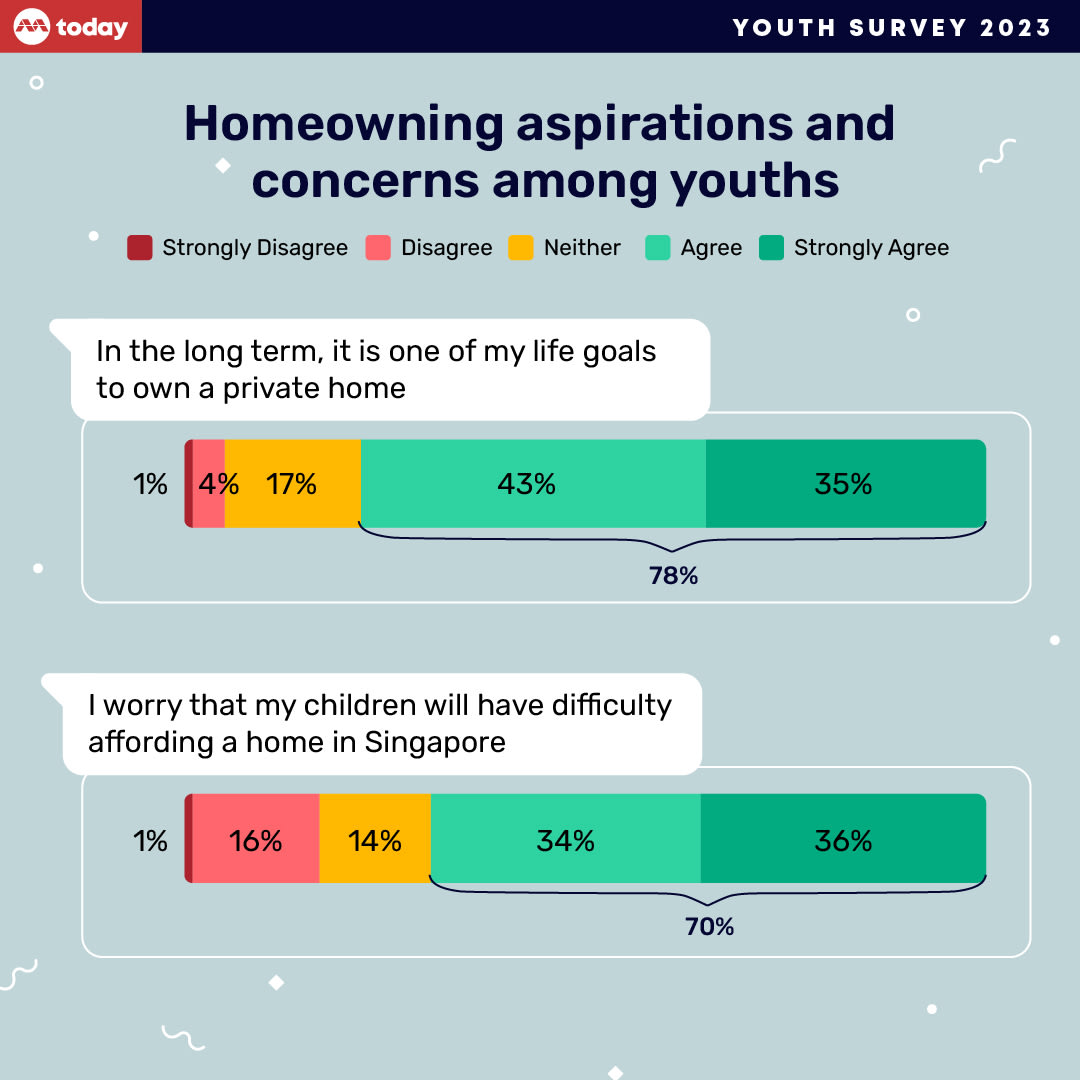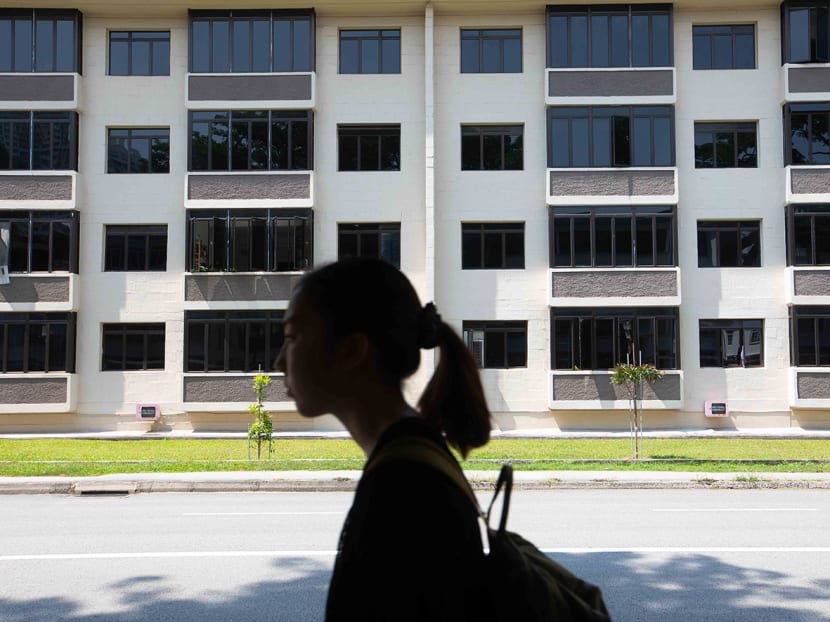- Joined
- Apr 14, 2011
- Messages
- 20,270
- Points
- 113
ADVERTISEMENT
TODAY Youth Survey: 8 in 10 aspire to own private homes as 'life goal'; experts say financial realities will temper expectations

Housing and renovation costs were the biggest worry among youths when it comes to cost of living, among a list of five items including groceries, healthcare, utilities and eating out.
Follow us on Instagram and Tiktok, and join our Telegram channel for the latest updates.
- A majority of young Singaporeans aspire to own private homes, but worry that their kids will not be able to afford houses in the future, the latest TODAY Youth Survey has found
- As many as 78 per cent said owning a private home is one of their life goals, though in reality most Singaporeans live in public housing
- 70 per cent said they were worried that their children will have difficulty affording a home in Singapore in future
- Sociologists told TODAY that the desire towards private housing is born from a wider aspiration for social mobility
- Concerns for house ownership among future generation reflect worries over rising costs seen today

BY
TAUFIQ ZALIZAN
Published October 18, 2023Updated October 18, 2023
WhatsAppTelegramFacebookTwitterEmailLinkedIn
SINGAPORE — For Ms Shuhadah, upgrading from a Housing & Development Board (HDB) flat to owning a private property is a goal she would like to achieve at some point in her life — not for herself, but for her future children, as she is concerned about the continuously climbing cost of homes here.
“A roof over our heads is a basic necessity. If I can save up for a freehold property and pass it down to my future child, then I don’t have to worry so much about them not having a home in the future,” said the finance technology professional in her 30s, who declined to give her full name.
ADVERTISEMENT
“Even if my future child does not want the house, at least it would be an asset that can be sold off and he or she can use the money for other necessities.”
In both her aspiration for private homeownership and worry for her future children's housing situation, Ms Shuhadah, who is married and plans to have a child someday, is far from alone.
The TODAY Youth Survey 2023, which was conducted in August, polled 1,000 respondents aged between 18 and 35.
READ ALSO
Concerns about housing affordability among issues raised at first Forward Singapore public engagement session
Among those surveyed, 78 per cent said owning a private home is one of their life goals. In reality, over 80 per cent of Singaporeans today live in public housing.
At the same time, 70 per cent said they were worried that their children will have difficulty affording a home in Singapore in future.
ADVERTISEMENT
Housing affordability has been a perennial issue among Singaporeans, including youths and young adults.
With aspiring homeowners having to contend with rising resale flat prices and backlogs in BTO project completions, the topic was discussed in Parliament several times and was raised during the first Forward Singapore public engagement session September last year.
The TODAY Youth Survey is an annual survey that seeks to give a voice to Singapore's millennials and Gen Zers on societal issues and everyday topics close to their hearts.
This is the third edition of the survey and it looked at youths’ views on housing, the importance of a university degree, career development, the gap between blue collar and white collar wages and civic participation.
READ ALSO
Private home prices in Singapore fall 0.2% in second quarter, first dip in 3 years
Sociologists told TODAY that the desirability of private housing among youths is not surprising because, among other things, it is seen as a signal of upward social mobility — a common aspiration among Singaporeans in general.
ADVERTISEMENT
They also said it makes sense that youths are uncertain about whether future generations can afford property, as they are likely comparing housing prices now against their parents’ time, and extrapolating a worsening situation moving forward.
HOW YOUTHS FEEL ABOUT HOUSING
When asked if it was important for them to own a property, either public or private, within their lifetime, a resounding 83 per cent said they agreed or strongly agreed.And when asked if it was one of their life goals to own a private home, 78 per cent said yes — 35 per cent said they strongly agreed and another 43 per cent agreed.
This aspiration to own a private home was especially high among youths aged 18 to 24, among whom 84 per cent agreed or strongly agreed with the statement, and among those from households with a monthly income of S$15,000 or more, with nine in 10 of such respondents agreeing or strongly agreeing.
They survey also found:
ADVERTISEMENT
- 76 per cent of respondents believe the minimum age for singles to buy an HDB flat should be lowered from the current floor of 35
- 75 per cent feel that society should priorities public housing for families
- 70 per cent worry that their children will have difficulty affording a home in Singapore
- 59 per cent expect to be better off than their parents in terms of housing
READ ALSO
Singapore further raises private housing supply to highest in 10 years
Meanwhile, more youths are now worried about housing and renovation costs.
As many as 60 per cent said they worry about this, an almost 20 percentage point increase from last year's survey.
Housing and renovation costs were the biggest worry among youths when it comes to cost of living, among a list of five items including groceries, healthcare, utilities and eating out.
In last year's survey, groceries was the top concern for them when thinking about the cost of living.
Previous





Next
WHAT TO DO ABOUT UNMET PRIVATE HOUSING ASPIRATIONS?
Mr Wayne Ten, who recently became a father, says owning a private home is a very important goal for him, because he wants to pass it down to the next generation.“It is a very good wealth distribution tool for our kids. With the rising prices of property, our kids will potentially get a decent bequest sum,” said the 28-year-old financial advisor.
READ ALSO
TODAY Youth Survey: 8 in 10 say blue collar workers should be paid more, but fewer think consumers should bear the cost
But others have a different take. Undergraduate Sherlyn Tan, 23, said the idea of having a freehold property to pass down to future generations is “nice” but hard to achieve.
“I grew up in HDB flats and I don't see an issue with just living in a HDB flat for the long run”.
Meanwhile, 35-year-old Cyrus, who declined to give his full name, said he noticed that property values are not appreciating as fast as they used to, so he would prefer leaving behind a portfolio of financial investments for his future children.
He added that he used to aspire to own a condominium, but their shrinking sizes over the years have made such homes inconducive for families.
“I've been to prison cell tours in Singapore and it seems like the cells there are bigger than some (condominium) rooms,” said Mr Cyrus, who is married and plans to have children in the future.
Dr Leong Chan-Hoong, the head of policy development, evaluation and data analytics at global policy advisory firm Kantar Public, said this generation of youth, having benefited from growing up in a period of global prosperity, would naturally want the best for themselves, and this includes private homes.
READ ALSO
TODAY Youth Survey: Large majority say having a degree is still necessary to succeed in S'pore, expect their children to attain it
But with only two in 10 Singaporeans actually residing in private homes today, it is likely that many youthful dreams will end up thwarted.
Sociologist Tan Ern Ser from the Lee Kuan Yew School of Public Policy at the National University of Singapore (NUS) warned that this could lead to "social tension, a feeling of being unfairly treated, and/or a politics of envy".
But he added that Singaporeans are adaptable people who are likely to reorder their priorities and not measure life quality “in purely materialistic terms”.
Dr Alwyn Lim from the Singapore Management University (SMU) agreed.
“Although many have aspirations to own private property, the financial reality of the increasing cost of private property (also driven by increased demand) will temper those expectations as younger Singaporeans grow older."
WHY YOUTHS WORRY FOR THEIR CHILDREN’S HOUSING
Even as they have high ideals for themselves, today's youths are already worried about their future children's ability to put a roof over their heads.READ ALSO
TODAY Youth Survey: 74% think they could be retrenched at least once, amid strong belief in taking responsibility to stay relevant
Ms Nandini earlier this year picked her four-room Built-to-Order flat. While it is a joyous milestone, it is also a moment tinged with worry that perhaps her future children may not be able to enjoy the same privilege in future.
“Right now, buying a house is already expensive to me. And many whom I spoke to also find them not only increasingly expensive but the sizes are getting way smaller,” said the 28-year-old, who is not yet married.
She and her partner plan to save up a small amount of money consistently for a fund to help their children in future, which can be put to use for housing or other important purchases.

Undergraduate Eugene Hu, 24, acknowledged that the Government offers various subsidies to offset homeownership costs in the public housing market.
“But at the end of the day, there's only that much that can be done by the Government,” he added. “With housing prices continuing to skyrocket, it will always be playing catch up in terms of monthly salary to housing prices.”
Why are the youths already so concerned for the next generation? Associate professor Tan from NUS said it could simply be because youths are comparing their purchasing power with their parents' and expect the trend to continue.
“(Their parents) were able to purchase a private property or even just public flats at lower prices (than now), and they then extrapolate that their children would be worse off compared to their own current situation,” he said.
Deputy director for research at the Institute of Policy Studies, Mr Christopher Gee, said that for some, the worry might not be about their children affording a basic home, but about whether their children are able to achieve their “aspirational home” or maintain their current living standards.
He noted that the higher income earners are showing a higher than average level of concern, with 84 per cent of those with household income of S$15,000 and above expressing such worries.
“They might be concerned that their kids may not be able to keep up with them,” he said.
Dr Lim from SMU said that the worry is mostly driven by broader concerns about the escalating cost of living.
“Some of this fear is driven by reports about the rarer cases of expensive resale public flats,” said the associate professor in sociology.
“There is also perhaps the fear that increased demand for private homes will also cause runaway inflation in the cost of public housing.”
Ms Nandini acknowledged that various measures ranging from subsidies and allowing the use of Central Provident Fund savings have gone a long way in helping Singaporeans own their own homes.
"If the prices continue to increase, all these perks (subsidies) have to be on par with them and not stay stagnant," she said.
"But it's not just these perks, we have to go beyond that and come up with more innovative solutions to keep housing affordable."




